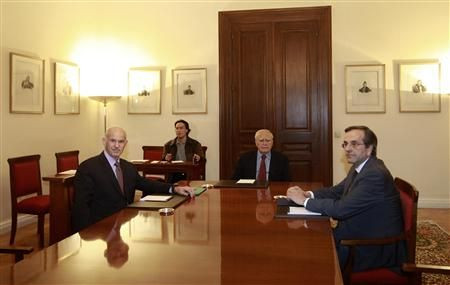Greek Officials Locked in Debate Over New Interim Government

The political bosses of Greece remain locked in negotiation over who will comprise a new unity government in the wake of Prime Minister George Papandreou’s agreement to step down after having secured approval of the latest Eurozone rescue package for the debt-ridden nation.
I believe that we are now close to an agreement with [the opposition party] New Democracy, Papandreou said during a Cabinet meeting
When one cooperates with another party, there are some red lines on either side which of course restrict things. Therefore, while one could imagine ideal situations, in reality these do not exist, and one seeks simply to find the best possible solution.
Whoever heads the new government will have the responsibility of ratifying the bailout and the foisting it upon an already-enraged Greek public -- all under the watchful eye of European Union (EU) and International Monetary Fund (IMF) monitors.
In absence of such a bailout, Greece would likely go bankrupt by year-end – an event that could spell disaster for the rest of the Eurozone.
While Papandreou and principal opposition leader Antonis Samaras of New Democracy had been expected to appoint a new interim leader by Monday, no announcement has been made as of Tuesday evening (Athens time). Papandreou held an emergency cabinet session that apparently yielded nothing new.
According to reports, the most likely new Prime Minister would be Lucas Papademos, a former vice president of the European Central Bank, who helped to engineer’s Greece’s adoption of the euro.
Another possible front-runner, Finance Minister Evangelos, is now expected to remain at his current job.
Thereafter, elections would likely be held next February in order to choose a more permanent new government.
Fox News reported that Eurozone officials were demanding that five senior Greek government figures – including Papandreou and Samaras -- sign a latter guaranteeing their commitment to the bailout and austerity programs, in exchange for the next $11 tranche of rescue money.
Samaras took offense to the demand.
There is national dignity, he said in a statement. I have long and repeatedly explained why, in order to protect the Greek economy and the euro, the implementation of the (new European debt deal) has become 'inevitable'. I do not allow anyone to cast doubt on these statements.
Meanwhile, a sense of urgency has crept into Greek society over the impasse.
The Greek newspaper Nea warned in an editorial on Tuesday: Today is the last chance for the two main parties. [Papandreou and Samaras] have to come up with a government strong enough to take the country out of the moving sand of political impasse that leaves us defenseless, at the mercy of the crisis. Time is up.
Similarly, the Ethnos newspaper demanded: A national unity government, right now. The country and the society cannot endure anymore.
A spokesman for the Athens government said a new regime should be sworn in shortly, with a confidence vote to be held within a week, barring any unforeseen circumstance.
Eurozone chief Jean-Claude Juncker said he is confident that now the situation in Greece is developing in the right direction but that it should have been done months ago.
© Copyright IBTimes 2025. All rights reserved.





















